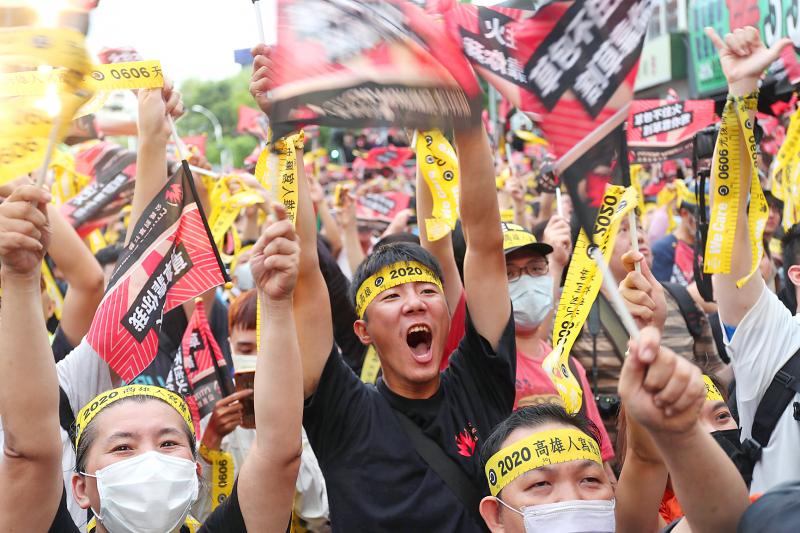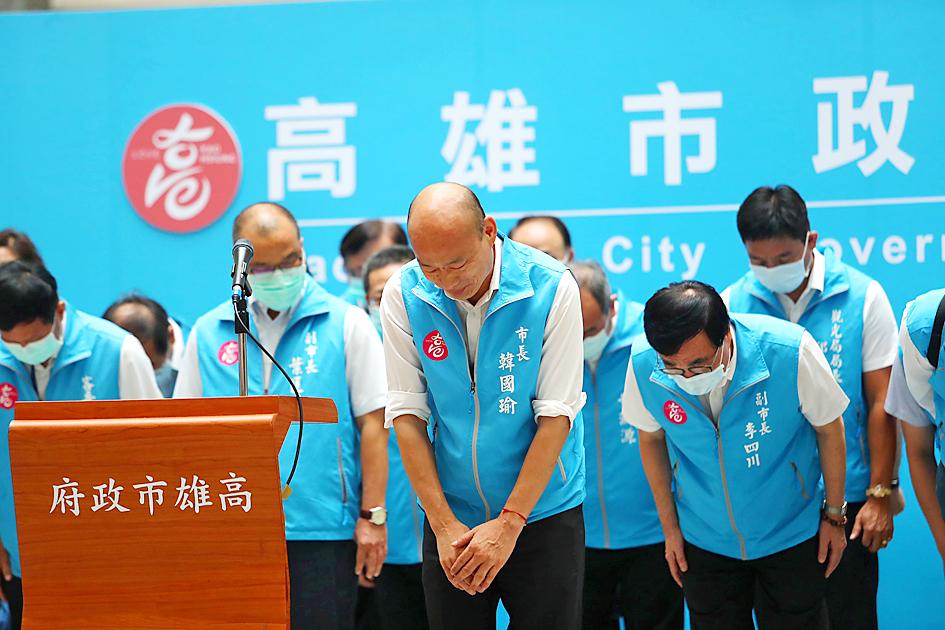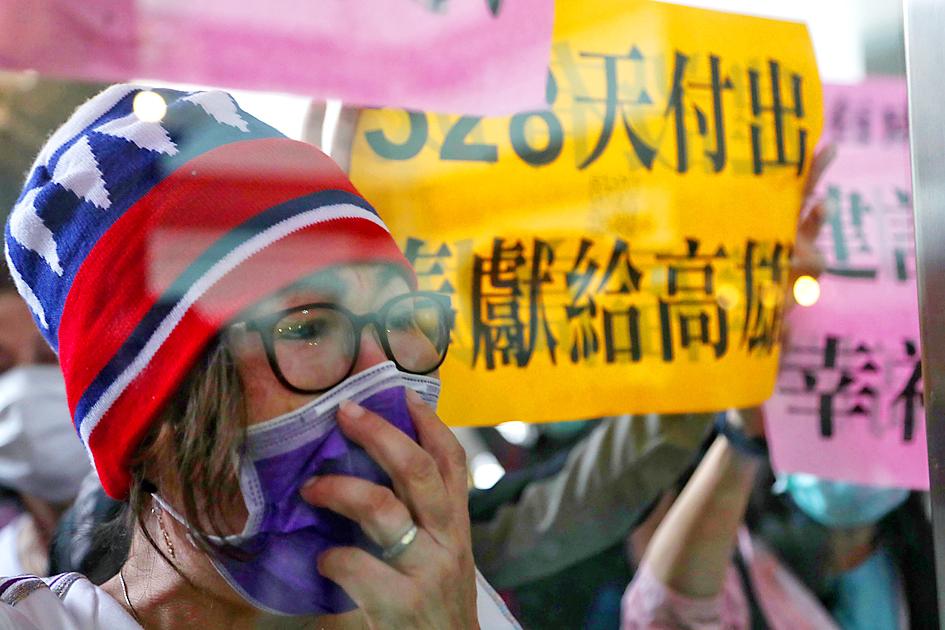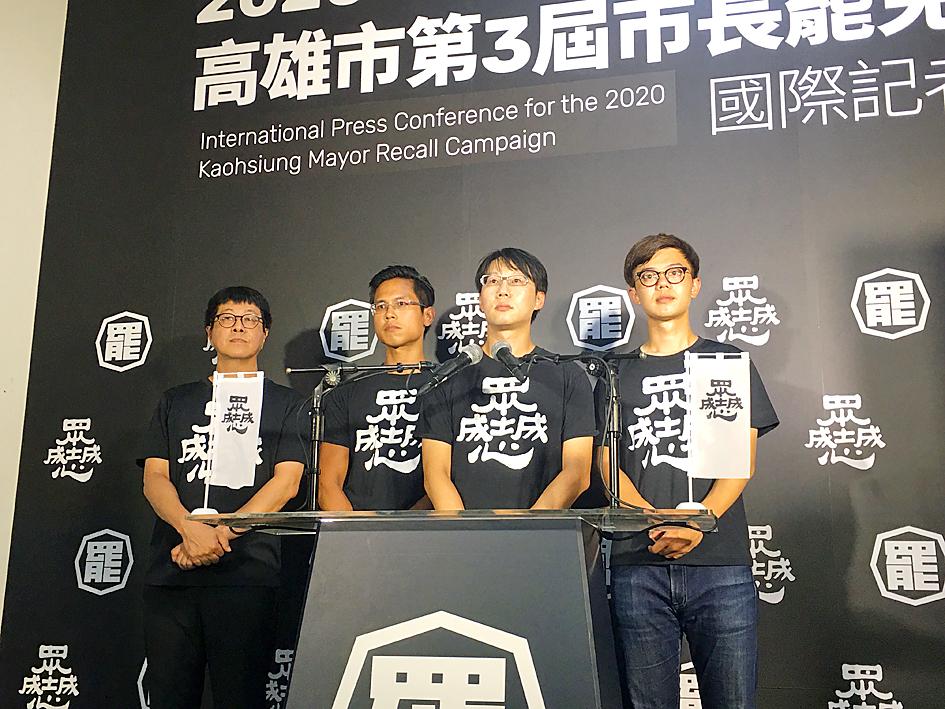Kaohsiung residents in a recall vote yesterday overwhelmingly voted to remove Kaohsiung Mayor Han Kuo-yu (韓國瑜) of the Chinese Nationalist Party (KMT) from office.
The result made Han the nation’s first special municipality head to be recalled, just a year-and-a-half after he won a surprise victory over a candidate from the Democratic Progressive Party (DPP), which had run the city for two decades.
The vote was 939,090 in favor of recall and 25,051 against, with a 42.14 percent voter turnout, Kaohsiung City Election Commission data showed.

Photo: CNA
There are 2,299,981 eligible voters in the city, the data showed.
At least 25 percent of eligible voters — or 574,996 people — had to vote in favor of a recall and the number of people voting for it must exceed the number of those voting against for the recall motion to pass, according to Article 90 of the Civil Servants Election and Recall Act (公職人員選舉罷免法).
The 939,090 votes in favor of the recall was more than Han had garnered in November 2018’s mayoral election, when he won the four-candidate race with 892,545 votes, or 53.86 percent, in a traditional DPP stronghold.

Photo: CNA
The recall petition against Han began in June last year, after Han announced a presidential bid less than six months into his mayoral term.
The civic organizations that initiated the petition said that Han launching a presidential bid so soon after being elected mayor angered many Kaohsiung residents, who thought he was not prioritizing the city’s governance.
The recall campaign had strong backing from DPP politicians.

Photo: CNA
After the vote results yesterday, Han led city government officials in a news conference and took a bow thanking Kaohsiung residents for electing him in 2018.
He also expressed his gratitude to city government officials who worked with him.
However, he said he was sorry to see the DPP focusing all its attention on “endless slander” against him since the party won the presidential election in January.

Photo: Hsu Lee-chuan, Taipei Times
The mudslinging has hurt the city government, as the hard work of its officials has been reduced to nothing, Han said.
Noting that agricultural produce exports have increased and the city government’s disease prevention efforts topped the nation, he said it is regrettable he could no longer lead his administrative team to serve the city and keep his promises to build new roads, attract investments and take care of disadvantaged people.
“I hope future mayors will lead Kaohsiung toward prosperity, and I hope Kaohsiung will become a great, bright and wealthy city, “ he said.
Some Han supporters broke into tears upon learning that the recall vote had passed. Some called on him to run for KMT chairman and again for Kaohsiung mayor in 2024, while others said Han’s recall was the city’s loss.
Supporters of the Wecare Kaohsiung coalition, which organized the recall campaign, were ecstatic, chanting: “I [am a] Kaohsiung [resident], I [am] proud.”
Lead petition organizer Chen Kuan-jung (陳冠榮) called on Kaohsiung residents to put aside their differences and help heal the rift that has plagued the city since 2018.
“New life has come, the people of Kaohsiung, clap for yourselves,” Wecare spokesperson Lee Yi-chieh (李佾潔) said.
The time of conflict, hate and lies has come to an end, and the residents of Kaohsiung should, together, embark on a journey toward true freedom, Lee added.
“We have succeeded and we are aware of the imperfections of the law, but that is what we can work toward, to make the power of the people greater,” Lee said.
Taiwan Statebuilding Party member Chang Po-yang (張博洋) said that the people of Kaohsiung can only rejoice for one night, because tomorrow they have to start working to mend the schism between city residents.
Chang also called on recall supporters not to blame those who disagreed with the movement, as they have different ideas, but love Kaohsiung nonetheless.
Additional reporting by Huang Hsu-lei and Fang Chih-hsien

CHAOS: Iranians took to the streets playing celebratory music after reports of Khamenei’s death on Saturday, while mourners also gathered in Tehran yesterday Iranian Supreme Leader Ayatollah Ali Khamenei was killed in a major attack on Iran launched by Israel and the US, throwing the future of the Islamic republic into doubt and raising the risk of regional instability. Iranian state television and the state-run IRNA news agency announced the 86-year-old’s death early yesterday. US President Donald Trump said it gave Iranians their “greatest chance” to “take back” their country. The announcements came after a joint US and Israeli aerial bombardment that targeted Iranian military and governmental sites. Trump said the “heavy and pinpoint bombing” would continue through the week or as long

TRUST: The KMT said it respected the US’ timing and considerations, and hoped it would continue to honor its commitments to helping Taiwan bolster its defenses and deterrence US President Donald Trump is delaying a multibillion-dollar arms sale to Taiwan to ensure his visit to Beijing is successful, a New York Times report said. The weapons sales package has stalled in the US Department of State, the report said, citing US officials it did not identify. The White House has told agencies not to push forward ahead of Trump’s meeting with Chinese President Xi Jinping (習近平), it said. The two last month held a phone call to discuss trade and geopolitical flashpoints ahead of the summit. Xi raised the Taiwan issue and urged the US to handle arms sales to

BIG SPENDERS: Foreign investors bought the most Taiwan equities since 2005, signaling confidence that an AI boom would continue to benefit chipmakers Taiwan Semiconductor Manufacturing Co’s (TSMC, 台積電) market capitalization swelled to US$2 trillion for the first time following a 4.25 percent rally in its American depositary receipts (ADR) overnight, putting the world’s biggest contract chipmaker sixth on the list of the world’s biggest companies by market capitalization, just behind Amazon.com Inc. The site CompaniesMarketcap.com ranked TSMC ahead of Saudi Aramco and Meta Platforms Inc. The Taiwanese company’s ADRs on Tuesday surged to US$385.75 on the New York Stock Exchange, as strong demand for artificial intelligence (AI) applications led to chip supply constraints and boost revenue growth to record-breaking levels. Each TSMC ADR represents

Pro-democracy media tycoon Jimmy Lai’s (黎智英) fraud conviction and prison sentence were yesterday overturned by a Hong Kong court, in a surprise legal decision that comes soon after Lai was jailed for 20 years on a separate national security charge. Judges Jeremy Poon (潘兆初), Anthea Pang (彭寶琴) and Derek Pang (彭偉昌) said in the judgement that they allowed the appeal from Lai, and another defendant in the case, to proceed, as a lower court judge had “erred.” “The Court of Appeal gave them leave to appeal against their conviction, allowed their appeals, quashed the convictions and set aside the sentences,” the judges